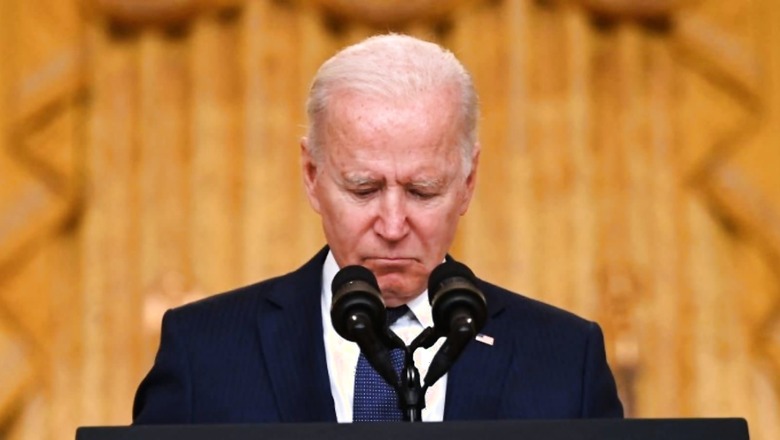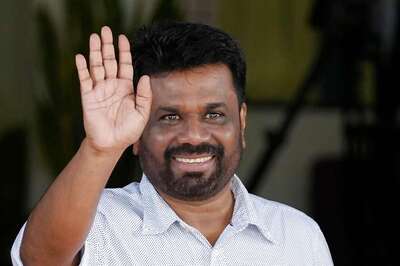
views
The 20 years of the US war on terrorism began with a bang in Afghanistan and has ended in a whimper there. Terrorism was a blight even before 9/11, but the scale and the daring of the 9/11 attacks were unprecedented. The symbols of economic and military power of the US were targeted to show the frightening reach of terrorism. The US was taken head-on notwithstanding the retaliation that was bound to follow.
In the phase of US unilateralism in global affairs that followed the demise of the Soviet Union, whatever the reservations countries may have had about US policies in various parts of the world, especially in West Asia, the sense of shock at the dramatic nature of the 9/11 attacks was such that the condemnation of the attacks was universal, with even countries hostile to the US expressing their sympathy and solidarity with the US. That President Putin was the first foreign leader to speak to President Bush was in a sense emblematic. He followed it up by stating on TV: “I want to say to the American people – we are with you.” Even Iran’s Supreme Leader Khamenei and President Khatami deplored the attacks, with crowds in Iran attending candlelight vigils. China’s President sent his condolences while thousands of Chinese condoled in front of the US embassy in Beijing.
Following the 9/11 attacks, President Bush declared a Global War on Terrorism (GWOT). Afghanistan under the Taliban, where Osama bin Laden, the architect of the attacks, was located, was the first target of GWOT. The Taliban regime was ousted through military action as it refused to hand over Osama.
The war on terror, mixed with a discourse on human rights and democracy, was extended to Iraq, Libya and Syria. In Iraq, the project of nation building signally failed, leading to the virtual break-up of the country, with sectarian strife and rampant terrorist attacks. The intervention in Syria yielded the same consequences. This instability and collapse of central governance in parts of Syria and Iraq produced the Islamic State, the germ of a powerful idea that has sprouted, with all its brutalities, in various parts of the Islamic world.
The fundamental mistake that the US made in Afghanistan was in not addressing the issue of safe havens and other forms of assistance provided by Pakistan to the Taliban. The Soviets had failed in Afghanistan because of these very safe havens of the mujahideens in Pakistan. With the US attention diverted to West Asia after the eviction of the Taliban from Kabul, the revival of the Taliban under Pakistani auspices began. As the US/ISAF (International Security Assistance Force) forces got bogged down in Afghanistan, and with US/NATO dependence on supply lines controlled by Pakistan, as also some value placed on intelligence information that Pakistan provided, Pakistan could continue its double game of being calculatedly useful to the US and at the same time aiding and mentoring the Taliban. With Obama, and later Trump, acknowledging that there was no military solution in Afghanistan and announcing the intention and the date of withdrawal, Pakistan and the Taliban had all the incentive to step up their terrorist operations and prepare to take over when the time arrived.
ALSO READ | The Strategic Disconnect between India and US Has Been Revealed by Afghanistan
Unmet Objectives
The declared objectives of America’s war on terror have not been met. To say that with the elimination of Osama bin Laden 10 years after invading Afghanistan and that too in Pakistan, and degrading Al Qaeda there, America’s objectives in Afghanistan have been met is a contrived argument. America’s initial objective was nation building in Afghanistan, till the realisation set in that this was not possible and disengagement was necessary. The time-tables of withdrawal, the Doha agreement, the softness towards Pakistan, the chaotic withdrawal on August 31 and the Taliban take-over are a result of this.
The irony is that the Taliban as terrorists and religious extremists were ousted from Afghanistan through military action by the US and today the US has handed Afghanistan back to the Taliban after recognising that they could not be defeated militarily. The objective behind GWOT was to win the battle of ideas. In Afghanistan, religious extremism of medieval vintage has prevailed over the modern ideas of democracy, pluralism, inclusiveness, respect for diversity, human rights, gender equality and so on. The values that the US stands for, which are at the root of the battle that the US and other democratic countries are set to fight against authoritarianism, not being upheld has much wider repercussions internationally. The management of the world order is involved.
The end-result of GWOT has not been the elimination of terrorism, be it Al Qaeda or the Islamic State, but the dispersal of extremist groups affiliated to their ideology in North Africa, the Sahel region and even southern Africa (Somalia, Mali, Nigeria and Mozambique). Islamic terrorism has viciously struck Bangladesh and Sri Lanka, and has targeted Thailand and the Philippines in Southeast Asia.
Contrary to the objectives spelled out by the Bush administration, the US has not been able to end terrorist sanctuaries and havens and state sponsorship of terrorism or strengthen and maintain the international effort to combat terrorism. Russia, which shared intelligence with the US for its military operations in Afghanistan and facilitated the use of bases in Central Asia by the US forces, is now at odds with the US in Syria, in the combat against Islamic extremists and in the handling of the situation in Afghanistan, though both Russia and China have consultative mechanisms on Afghanistan. The Chinese are of course exploiting the US withdrawal from Afghanistan to sow doubts about the reliability of the Americans in the minds of its allies.
Diminished Standing
The terrorists have not been defeated nor their organisations destroyed either in Pakistan or Afghanistan. Despite Pakistan’s state sponsorship of terrorism, not only against India but also against the US forces in Afghanistan, the US has ignored this and actually sought Pakistan’s help to facilitate its withdrawal from Afghanistan through its links to the Taliban. Ironically, where the Islamic State was destroyed in West Asia by the US, Russia and Iran principally (with the US itself accused of funding extremist Islamic groups opposed to the Islamic State), the US has handed over to the Taliban a State—that of Afghanistan, with its new government composed of a large number of UN-designated terrorists. A member of the Haqqani group considered by the US as “a veritable arm of the ISI” and with a FBI bounty on his head is now the Interior Minister of Afghanistan.
The fall-out of GWOT in Europe has been politically and socially costly, with public spaces and civilians targeted by terrorism, to which has been added the highly sensitive issue of the influx of refugees from Muslim countries. Anti-immigrant, not to mention anti-Muslim, sentiment has grown, with right-wing nationalist parties gaining political strength. The manner in which the Biden administration has withdrawn from Afghanistan without yielding to European concerns about the time-table of evacuations has added to misgivings in Europe about the durability of America First syndrome in the US, besides being seen as a foreign policy disaster for the western alliance as Afghanistan was the locus of NATO’s first out-of-area operations.
The course of events in Afghanistan and in West Asia also demonstrate not only the failure of the US interventions and GWOT as such, but also how it has gravely damaged the US image, drained its economy, exposed the limits of its power, created a sense of uncertainty about the US upholding its commitments, given ammunition to its adversaries to cast doubt about the US reliability, and generally diminished its standing as an unchallenged global power.
The author is Former Foreign Secretary. He was India’s Ambassador to Turkey, Egypt, France and Russia. The views expressed in this article are those of the author and do not represent the stand of this publication.
Read all minute-by-minute news updates for Uttar Pradesh election results 2022, Punjab election results 2022, Uttarakhand election results 2022, Manipur election results 2022, and Goa election results 2022.
Click here for seat-wise LIVE result updates.




















Comments
0 comment